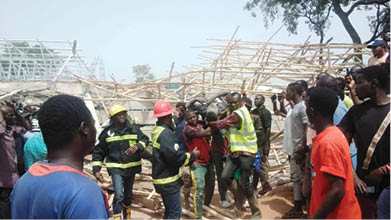A two-story building under construction on 6th Avenue in Gwarinpa Housing Estate, Abuja, has collapsed, leaving two people dead, with about 40 others trapped.
Speaking to newsmen at the site of the collapse, the Coordinator, Abuja Metropolitan Management Council (AMMC), Umar Shuaib, said that 60 people had been rescued so far.
While the cause of the collapse is yet to be known, Shuaib said, “Our priority is to rescue lives first.
“We got here as fast as we could whe we received the distress call.”
‘Many’ trapped as building collapses in Abuja
Many injured, 11 arrested in rival cult clash in Lagos
The Director of Development Control of the Federal Capital Territory Administration (FCTA), Murktar Galadima, said apparently six persons were still trapped in the rubble.
Developer violated building plan – FHA
Reacting to the collapse, the Federal Housing Authority (FHA) said the developer of the building violated the building plan approved by the authority.
In a statement, FHA’s Head of Public Affairs, Kenneth Chigelu, said the building was a frame structure with columns, suspended slabs in place and some block works at the time of the collapse.
He said, “Preliminary findings revealed that an approval for two floors was granted to the developer, who decided to add an extra floor to the structure. The structure is a private commercial development owned and situated on 6th Avenue.”
He added that investigation was ongoing to reveal the immediate and remote causes of the collapse.
Meanwhile, worried by the rising cases of building collapse across the country, the Council of Registered Builders of Nigeria (CORBON), has set up the “Project Evaluation and Monitoring Unit” to monitor all buildings under construction accross the country for quality assurance.
The Chairman of CORBON, Dr Samson Ameh Opaluwa, disclosed this in Abuja on Thursday during the induction ceremony of newly registered professional builders.
He said quacks would no longer be allowed to function in the built environment because most of the building collapse cases were linked to unprofessional elements.
He said the 373 inductees was the highest number in a single induction since the establishment of the council in 1989, adding that they would add to the number of professionals in the built industry.
By Seun Adeuyi, Faruk Shuaibu & Chris Agabi

 Join Daily Trust WhatsApp Community For Quick Access To News and Happenings Around You.
Join Daily Trust WhatsApp Community For Quick Access To News and Happenings Around You.


